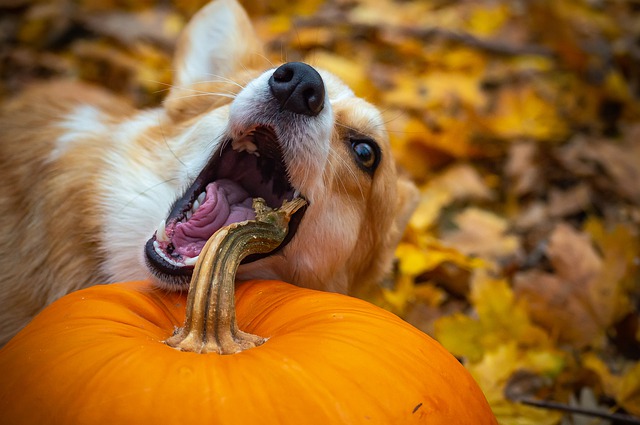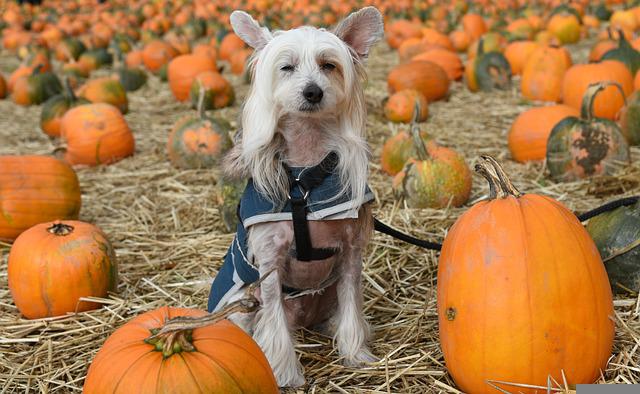Will the Dog Eat Pumpkins? Feeding Pumpkins to Dogs

Pumpkins can be fed to dogs, but you must be careful about which parts you give them. As you may have guessed, they’re considered a “superfood” for dogs and contain a surprising amount of nutrients. It’s safe for dogs to eat the pumpkin’s pulp and the seeds.
Since small pumpkins and gourds may resemble a toy or ball, dogs may be unable to resist picking them up if they are left within reach, so exercise caution.
As with most of the foods your dog consumes, moderation is key. Although pumpkin is entirely safe and healthy to consume, consuming too much of a good thing is possible. If your dog eats too much at once, the high fiber content can cause an upset stomach. There is also an abundance of beta-carotene, which is converted into vitamin A. Although your dog requires some vitamin A, excessive amounts can be toxic.
Table of Contents
Which Pumpkins Are Safe For Dogs?
To incorporate pumpkin into your dog’s diet, plain, canned pumpkin is the best option. You must buy a canned pumpkin that is unflavored.
Canned pumpkin mixes, such as pumpkin pie filling with cinnamon, nutmeg, cloves, or spiced mocha chai pumpkin, can be toxic to dogs because of the cinnamon, nutmeg, and cloves that they contain.
Can Dogs Get Sick from Overeating Pumpkin?
It’s important not to overfeed your dog’s diet with pumpkin, as too much can be toxic.
Beta-carotene, abundant in pumpkin, is converted by dogs’ bodies into vitamin A by beta-carotene. Dogs can die from excessive vitamin A intake.
This should not deter you from including this nutritious gourd in your pup’s diet. Pumpkin is perfectly safe to give to dogs of all sizes, small or large. But, as always, seek approval from your veterinarian first.
How To Add Pumpkin To Your Dog’s Diet

Fresh Pumpkin
Fresh pumpkin is a healthy, natural treat that doesn’t need to be steamed or boiled. It can also be lightly salted and then frozen for later use as an excellent addition to your dog’s diet.
Frozen Pumpkin Puree
If you want something super quick for dogs on the go (and not too messy), look into thawing up some canned pureed pumpkin in a few seconds instead of letting it stand out on the counter and filling it with water, then letting it sit out for the dog to lick. The canned puree is a natural source of fiber and vitamins that your dog shouldn’t turn away from!
Pumpkin Seeds
Make sure that the pumpkin seeds you offer your dog are unsalted. If they’re salted, it can lead to a dangerous electrolyte imbalance called hypokalemia if eaten in high amounts and too often. To prepare, remove the seeds and bake them for an hour at 350°F. If your dog has trouble chewing, try pulverizing them in a food processor to make them more palatable for your canine companion.
Canned Pumpkin
Plain canned pumpkin is the simplest way to incorporate pumpkin into your dog’s diet. Ensure that you are feeding them pure, plain pumpkin instead of pumpkin pie filling. The filling of pumpkin pie contains xylitol and other ingredients toxic to dogs, such as spices. Pumpkin puree in a can does not need to be cooked before being fed to your dog; it can be fed raw.
Blended With Other Foods
You can give your dog pumpkin by itself or mix it with other foods. This is an excellent way to help your dog get used to the taste if they don’t like trying new things. You can put pumpkin from a can on top of their food or mix it in. If you want to make your dog treats, you can bake pumpkin instead of fat to use as a filler.
Health Benefits
Natural Treatment for Worms and Parasitic Infestations
Pumpkin seeds are a great source of ricinoleic acid, rich in zinc, and an inhibitor of tapeworms. Additionally, it also inhibits roundworms. It’s important to know that pumpkin seeds contain the amino acid cucurbitin, which is effective in paralyzing and killing parasites in your dog’s digestive tract. You can either eat the seeds as they are or grind them up and add them to your meal. Once or twice a day, feed your dog one-quarter teaspoon per ten pounds of body weight until the worms are eliminated. Dosing concerns and side effects like diarrhea, vomiting, or an allergic reaction can be avoided using pumpkin seeds instead of a veterinary dewormer. Protein, amino acids, and numerous other nutrients can be found in pumpkin seeds, making them an excellent dewormer.
Prebiotics
To help your dog’s digestive system, these supplements can help support the good bacteria in their digestive tract. Pumpkin, which is rich in fiber, can also be used to alleviate your dog’s diarrhea. But if your dog has diarrhea, you must find out what’s causing it. You want to be able to rule out potentially life-threatening conditions like parvo, which can be fatal if left untreated.
Carotenoids and Vitamins Abundant in Pumpkin
Carotenoids give the pumpkin its orange color. Pumpkin seeds are praised for their antioxidant levels. Antioxidants slow aging, protect eye health, and fight inflammation and related diseases.
Pumpkin contains vitamins A, C, zinc, and magnesium. Vitamin C boosts immunity, while Vitamin A promotes eye health. Pumpkin’s Vitamin C may help dogs with mobility issues. Pumpkin’s zinc promotes a healthy coat and skin. Magnesium helps maintain bone, eye, and nervous system health.
Supports Digestive Tract
Pumpkin flesh contains high soluble fiber. It’s an excellent laxative for those who suffer from diarrhea or constipation. Pumpkin’s fiber aids digestion by providing food for good bacteria in the intestines. Pumpkin absorbs excess moisture and bulks up your dog’s stool to help control diarrhea. On the other hand, a pumpkin’s high water and fiber content can ease constipation and maintain a smooth digestive process.
For smaller dogs, start with a few teaspoons per day. For larger dogs, one or two tablespoons may be required. Even if diarrhea or constipation isn’t a problem, adding pumpkin to your dog’s diet can help keep him regular.
Intestinal Health Benefits of Pumpkin
Pumpkins contain oils thought to aid in urinary health, and their flesh and seeds contain these oils. Pumpkin seeds and flesh may help alleviate urinary incontinence in dogs. Small amounts are required, as is the case with other applications.

